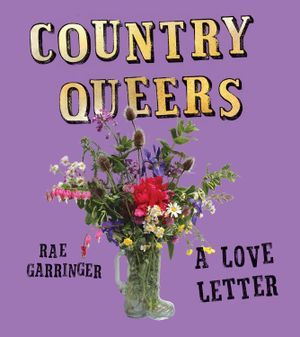A Love Letter to Country Queers
⚓ Books 📅 2025-07-22 👤 surdeus 👁️ 17Though I grew up in the suburbs, I have lived in many rural places throughout my life, and I now live in the woods, in a small town of about 500 people in rural Massachusetts. (Yes, contrary to popular belief, parts of Massachusetts are rural.) I have so much love for rural places and people, and especially for rural queers. I’ve been following Rae Garringer’s Country Queers oral history project for years, so when I saw they were turning it into a book, I immediately got myself a copy. I was not disappointed.
 Country Queers by Rae GarringerThe subtitle of this collection of interviews, photographs, and ephemera, “a love letter,” captures the ethos of Garringer’s project. Over many years, they traveled around the country (primarily the South and Southwest), visiting with queer people living in rural places. On farms in Virginia and North Carolina, in small towns in Texas and New Mexico, in fields, forests, and country kitchens, they speak with the people they meet about their lives. |
The interviews in the book are excerpts of longer interviews (which you can hear on the podcast), but even the shortest ones are wonderful. Folks talk about how much they love the landscapes and communities they come from and/or live in, the hardships they face in the same communities, the compromises they sometimes make, and the connections they’ve been able to forge in rural places and small towns that they haven’t found in cities. They talk about queer organizing, tending animals, loneliness, rural joy, racism, family, the nuances of being out or not, and more.
Though the focus is on the interviewees, Garringer’s voice throughout is warm, funny, thoughtful, caring, and overflowing with love for the complicated, contradictory, joyful, celebratory, and difficult lives of rural queers. They grew up in the mountains of West Virginia, and their own experience of complicated love for place, of leaving and returning home, is woven into the fabric of the book. Their love for the rural South and the richness of rural Southern queer cultures is at the heart of this project, but they also offer thoughtful context in the introduction about the project’s scope and limitations, and their position as a white oral historian.
I do want to note that though it’s not explicitly stated, Garringer’s focus is on the South, and most of the interviews take place there. Rurality—and rural queer experiences—are geographically specific, though there are commonalities across geographies and regions. It makes sense that this book focuses mostly on Southern queer experiences. Just don’t go into it expecting to hear from rural queers all over the country.
In a world that either completely erases rural queer people or paints rural queer life as only bleak and tragic, this book is a balm. I hope it opens the floodgates and that we start to see more and more rural queer stories like this, stories that honor the messy, beautiful lives of rural queer people instead of flattening them into stereotypes.
🏷️ Books_feed